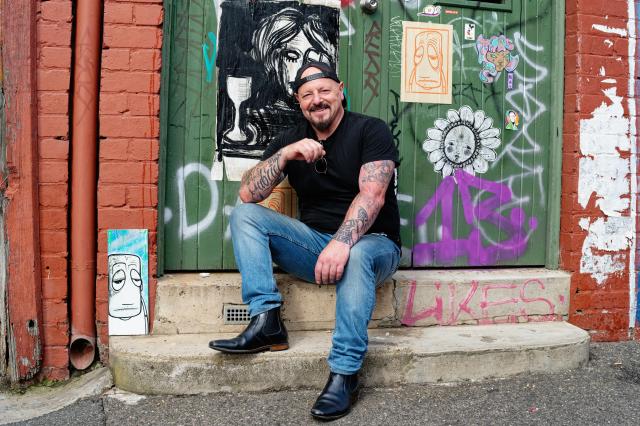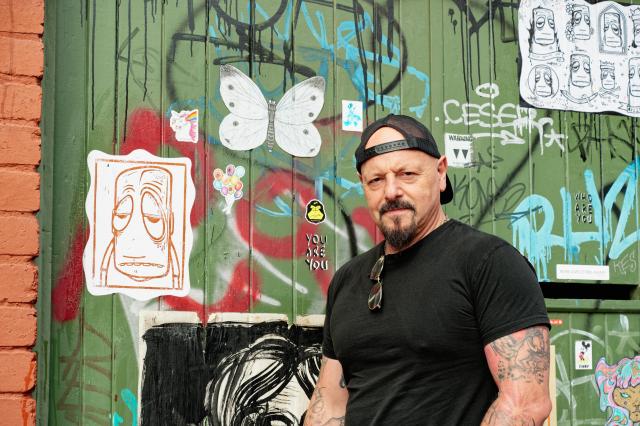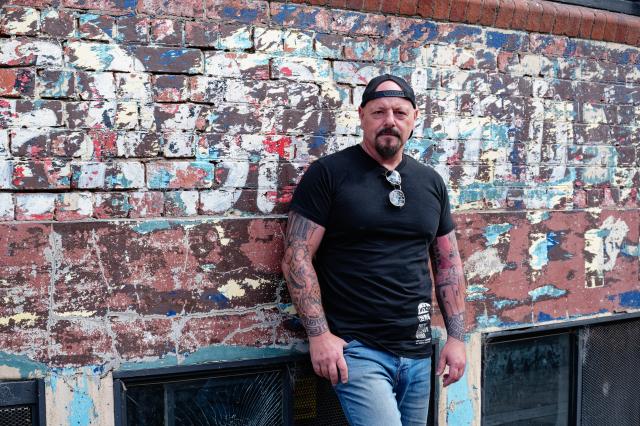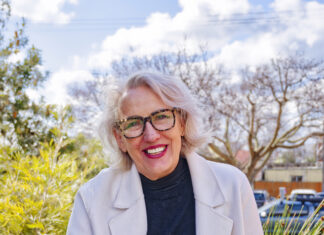Geelong rocker Michael Stangel has lived an extraordinary life so far, travelling the world playing music, going deep on the Voice in 2013, and surviving a terminal diagnosis. He spoke to Matt Hewson about what he’s learned along the way.
Michael Stangel has countless stories from his time in the music industry; playing late night shows in Hollywood, rubbing shoulders with the rich and famous, the rise and fall of the production company he was a big part of.
“A friend of mine said to me, look, if I believe everything you say, you must be 800 years old,” Michael said.
“And that was before going on the Voice or any of that. There are so many stories.”
But the story that has dominated Michael’s life for the past decade has been the terminal diagnosis he received in 2012 and the impact that could have on his family.
“I’ve been so thankful for everything that’s happened, and having that experience I treat it as a real honour to be able to get through; to think I’m going to die, and not die,” he said.
Michael was born in Geelong and, after spending some of his early years in Lakes Entrance, attended Belmont High School.
As the end of his schooling approached, Michael knew what he wanted to do.
“It had always been music; I started playing professionally at the age of 14 in bands and music was really the only thing I had any passion to pursue,” he said.
“My parents were not enthusiastic about that, being Greek, but I had an entrepreneurial flair, so I bought the PA at a young age and tried to make money out of it.
“I worked in the family business, which was a second-hand scrapyard dealer, and on a boat when dad was a fisherman, but other than that I played in a wedding band from age 14. And we were making good money.”
Michael took every opportunity he could in the music business, spending time living in Spain recording music (“Like most things it didn’t really eventuate and I came back with my tail between my legs, but it was a great experience”) and gigging filming a TV show in Hollywood (“We had this crazy manager and got right into the scene”).
But all that changed in September of 2012, just months after meeting his wife, Jodie.
“We were only together for about three or four months and I started to get a bit sick,” Michael said.
“We were in Sydney at a UFC event and I remember being really puffed out and thinking something was wrong.
“Then I had an echocardiogram of my heart and I found out I had a five-and-a-half centimetre tumour in the left ventricle of my heart.”
After a successful emergency surgery, the relatively rare myxoma tumour was removed, and Michael was told he was in the clear.
“It was a benign tumour, so it grows, but there’s no metastasis around the body,” he said.
“But after recovering from open-heart surgery, probably three or four months later I wasn’t able to pick things up or focus on anything. And I had the worst headaches you could imagine.
“I ended up going to emergency, they did a scan and found that there were seven tumours lodged in my brain.”
While cardiac myxoma is the most common benign cardiac tumour, brain metastases are extremely rare.
“I think four or five times in written history there’s been a shower, where the tumour fragments end up in the brain,” Michael said.
“They said, ‘I’m really sorry, this is not good. It’s very advanced so get your affairs in order, and if you make Christmas, that’ll be great.’”
For Jodie, who had been widowed once before, and Michael’s children, the news was devastating.
“I was devastated too, but not so much for me, but for them,” he said.
“I had young kids, the youngest was two-and-a-half, the oldest was about 10.
“We just didn’t know what to do in that moment.”
Michael decided to concentrate on the only thing he had any control over: his attitude.
“I’ve always been a pragmatic person and my heritage is Greek, so I’ve always been a fan of philosophy and the ancient Greek philosophers,” Michael said.
“I didn’t follow it too much, but some of the things that I’d read before really applied to me; things like being a good man, not just saying you’re going to be a good man. The Eckhart Tolle thing, the power of now, that became really apparent to me.
“The terminal diagnosis was the impetus for me thinking, okay, it’s not about becoming a rock star anymore. It’s about focusing on the things that are really important, and that’s my family.”
However, after four tumours had been removed from Michael’s brain, he was told a fifth needed taking out but the surgery came with significant risk.
“It was in a place that was really, really dangerous, and they told me the chances of losing the use of the right side of my body were more than half,” Michael said.
“I decided, it’s about quality of life and I don’t want to end up like that, so I chose not to have the operation.
“And probably about two months after that, for some reason my tumours just stopped growing.”
Michael’s doctors told him the longer the tumours didn’t grow any more, the better the chances they wouldn’t grow at all.
He had survived, although not without cost; Michael suffered epilepsy, seizures and PTSD after the surgeries.
But the attitude shift Michael had experienced also endured.
“I determined that I’d just concentrate on what’s happening in the here and now; plan for the future, but live your life out,” he said.
“Three months at a time, that was a catchphrase, because I’d been told I had three months to live.
“I’ll be honest, before that I had a bit of a temper. But it just became so silly and childish to me, to worry about all these meaningless things. The only meaningful thing is the relationships you build and how you fuel those relationships.
“My dream growing up was to be really famous, really rich. But I’ve learned to enjoy what I have and appreciate it.”
Michael and Jodie featured on a recent GMHBA ad, with Michael in his boxer shorts and Jodie in a nightdress, which he said reflected his newfound approach to life.
“Like, we’re on one of those big billboards on the Westgate Bridge, and my nipples are three feet high,” he said.
“But it’s cool, life is fun. Don’t take it too seriously.”
Michael has returned to a life of performing, playing a lot in the Geelong area, and has also taken on the role of chair of the Geelong Waterfront Film Foundation.
“Like I say to my son – he’s always trying to work out the meaning of life – the meaning of life is to get up, go to work, and don’t be a dickhead,” he said.
“Then life tends to be a bit easier. I’ve learned to be comfortable with the process of life and to live it, enjoy it and just be okay.”











